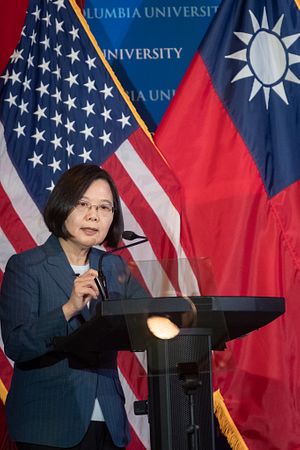Taiwan President Tsai Ing-wen expressed her desire this week for her country to reach a bilateral trade agreement with the United States, saying it would “strengthen our engagement” and help establish “a rules-based trade order” in the region.
Tsai’s comments follow the unanimous passage in the U.S. Senate last month of the TAIPEI Act, which calls for the two parties to begin negotiations on a free trade agreement. Tsai also pushed last month to resume talks with the United States under the Trade and Investment Framework Agreement (TIFA) in a meeting with the de facto U.S. ambassador to Taiwan.
Speaking on Tuesday at the American Chamber of Commerce Taipei, Tsai touted her administration’s efforts to diversify the island’s economy and move it away from a reliance on production bases in China.
Taiwan, however, bans imports of U.S. beef and pork due to the use of a feed additive by U.S. farmers. The additive, ractopamine, is banned by about 160 countries around the world, including the European Union, Russia, and China.
Ractopamine, which promotes leanness in livestock, was investigated in 2009 by the European Union, which concluded there was not enough data to prove its safety for human consumption. But the U.S. pork industry has pushed the EU and other countries to remove their bans on ractopamine, despite its controversial initial approval and questions about its safety from the U.S. Food and Drug Administration, according to Live Science.
The import ban on U.S. beef and pork has been a longtime sticking point between Taiwan and the United States, and any move to overturn the ban in Taiwan could trigger protests from Taiwanese farmers and public health concerns less than two months between Taiwan’s January 11 presidential election.
A trade agreement between Taiwan and the United States faces other clear hurdles, including Taiwan’s political status and potential objections by Beijing as the United States and China continue negotiations to end their ongoing trade dispute.
Taiwan has positioned itself to benefit from the U.S.-China trade war. Its economy showed stronger than expected third quarter growth – ahead of figures from South Korea, Singapore, and Hong Kong – aided in part by Taiwanese companies shifting production from China to countries in South and Southeast Asia.
However, China remains Taiwan’s largest trading partner, and analysts told the South China Morning Post last month there are fears Beijing could cancel the Economic Cooperation Framework Agreement, signed in 2010 during the administration of former President Ma Ying-jeou, which gives certain Taiwanese exports preferential treatment in China.
The United States and Taiwan likely share a reluctance to rock the boat prior to Taiwan’s upcoming election, meaning the two sides are unlikely to do more at this stage than express interest in a trade deal.
Tsai remains well ahead of her challenger – Kaohsiung mayor Han Kuo-yu of the Kuomintang (KMT) – in opinion polls, assisted by her administration’s handling of Taiwan’s economy and its strong relations with the United States.
Tsai said on Tuesday that Taiwan’s exports to the United States increased by 17.7 percent from January to October of this year. Exports to China decreased by 6.65 percent, she said.
Tsai’s Democratic Progressive Party (DPP), however, faces several tough reelection battles in legislative contests and could risk losing its majority with a strong performance from the KMT or from third parties, including the newly founded Taiwan People’s Party (TPP) of Taipei mayor Ko Wen-je.
Some of those battles will take place in rural areas dependent on agriculture, and farmers may react negatively to any legislative candidate who supports repealing the island’s ban on ractopamine.
The TAIPEI Act, passed in October by the U.S. Senate, retains broad bipartisan support among U.S. lawmakers and calls for a strategy of economic support for countries that have “strengthened, enhanced or upgraded relations with Taiwan,” along with urging the signing of a free trade agreement.
Han, the KMT presidential candidate, has called for closer social and economic ties with China, leading to a perception that he is the “pro-Beijing” candidate of the race.
Han traveled to the United States earlier this year and met in August with Brent Christensen, director of the Taipei office of the American Institute in Taiwan, the de facto U.S. embassy.
In March, Han made a controversial trip to Hong Kong, Macau, and China to promote trade with Kaohsiung, during which he met with government officials including members of China’s Taiwan Affairs Office.
Tsai, who recently named her former premier William Lai her vice-presidential candidate, will continue to advertise the potential of Taiwan-U.S. ties to blossom as she approaches January’s election.
Should she win, however, a bilateral trade agreement may prove easier said than done.

































